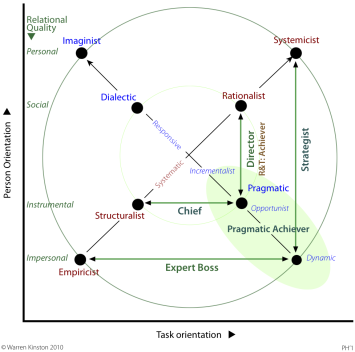False Negatives 1: Decision-making

THEE invites us to consider the leadership potential of the four decision-making categories that have not been identified by R&T:
■
■
■
■
They do not feel a need to have a systematic approach as a complement. However, they will ensure the presence of systematic types in support roles. Such leaders are usually intense, driven and may be charismatic.
![]() Q:How could this have been omitted by R&T?
Q:How could this have been omitted by R&T?
is common, and an essential complement to enable other methods of deciding to become leader-like: cf. the Achiever-; -Strategist and -Expert-.
tend to be as well: note the ultra-low orientation to people and the ultra-high focus on the task. However, many and are not primarily power-centred.
R&T are deep into pragmatism:
their publication reveals their distaste for perfectionism and preference for muddling through. ![]()
Read more:
The is an exceedingly powerful leadership style and rather common. insist that the way to achieve is:
The is a with the as the second string to his bow. That string enables rules to be broken and problems to be rapidly snuffed out—but only if they seem likely to impede delivering the desired results. Note that relate to people instrumentally.
By adding the and the , we have now identified all types that are:
intrinsically high on Task orientation,
or
if low, like the Expert-Boss and , can be complemented by an effective approach. Check out the diagram.
The is a that is far too concerned with people to focus properly on task outputs. Such people find roles in supportive functions like personnel or organizational development, and gravitate to welfare and therapy organizations. However, an can only serve as a leader, if he or she activates a viable leadership category. That could be the —not mentioned by R&T and best appreciated via different THEE frameworks.
There is also the , also known as a "bargaining" "arbitrating" or "negotiating" style. This is responsive and rarely supports leadership except in the political realm. Much management can morph into fuzzy handling if the organization is sleepy or a government bureaucracy. Leaders of groups struggling for power in society may well adopt this approach—read more in the .
For further details, visit this page in the satellite.
- Now for the false negatives associated with personal interaction.
Last Updated: 12-Jan-2012
